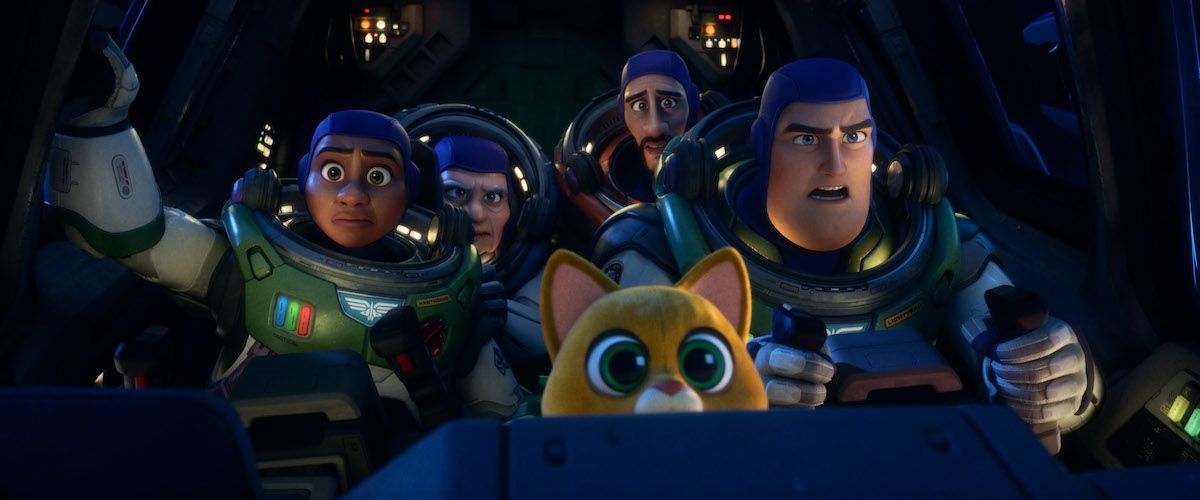By Jonah Naplan
June 20, 2022

Review: Pixar demonstrates their usual charm and charisma, but doesn't really show us anything new in 'Lightyear.'

By Jonah Naplan
June 20, 2022

“Lightyear” is not a real space adventure movie, but rather an allegory for one. It has all the elements of your regular sci-fi film, but each aspect has been carefully "Toy Story-ified." And that’s actually a good thing. The film recognizes and truly respects its audience, acknowledging the "Toy Story" fans that come along with it. It has pleasant moments of nostalgia, without ever being blindsided by them. Even though it cleverly references and ties back to the original, utilizing either simple lines of dialogue or entire action set pieces, the film still remains its own work of art, a feat few non-animated films can even achieve. “Lightyear” is an original adventure, independent from what came before. It wears its heart on its sleeve, and is exciting from both infinity and beyond.
Buzz Lightyear (Chris Evans) is a man of great importance and desire. He wants to do big things, fly to big places, and go to such extents no one ever has before. But he’s still not the bravest man for any mission that can be given to him. In the opening scene, he has to be saved by his partner, Alisha Hawthorne (Uzo Aduba), several times, and describes his surroundings to himself via a mission log that no one actually listens to. It makes him less nervous, he tells us. When you sit down to really break it apart, piece by piece, you begin to realize that this film acts as a true character study for Buzz Lightyear. In ways I won’t dare to spoil, the underlying conflict of “Lightyear” is Buzz fighting an internal battle against himself. And he’s not really winning.
Lately, I’ve noticed a trend in Pixar’s recent filmography. Many of their films from the past few years, excluding “Soul,” have told simple stories with metaphors for greater undertones. “Turning Red” was a simple coming-of-age story about a young girl going through her teenage years. The aspect of the massive red panda was a metaphor for puberty. In “Luca,” the title character and his friend Alberto, had the ability to turn into sea monsters. Said ability was a metaphor for gender identity.
It’s a little difficult to explain the metaphorical messaging in “Lightyear” without revealing spoilers, but, trying to stay vague, I’ll just say that the way a certain reveal involving Zurg is introduced plays as a metaphor for Buzz’s regret and fear for what could happen to himself in his latter years. And boy, does this film deal a lot with the prospect of the future. In the first half hour of the film, a specific montage takes place that many reviewers (and friends of mine) have referred to as “The Scene.” Not only is this because they don’t want to refer to it as anything else, in the fear of spoiling its greatness, but it’s also because simple words cannot describe it as anything more than “The Scene.” To put it briefly, the montage shows progression over the course of several decades. Buzz gets lost in time while trying to get back home, and keeps trying over and over again with no success, going back to the same spot each time he returns. It’s a very deep scene, geared towards the more mature viewers. Pixar is great at producing moments like those.
But don’t worry. “Lightyear” isn’t all sad and solemn. It is still a space adventure after all. In “Toy Story 2,” we got a few shots of space, but nothing as grand as what Pixar has been able to create here with “Lightyear,” some of the best, most realistic animation I have ever seen put to film. But while the film is so large in scale, it’s still important to notice the little details that Pixar thoughtfully put into their film. There was one shot in particular, where Buzz was leaning in from the right side of the frame, where I could actually see the individual pores on his face. I can’t imagine the time and effort it must take to animate each and every pixel in each and every frame of “Lightyear,” while still making it quite a decent movie.
Part of the reason why “Lightyear” works so well at disconnecting itself from the other Toy Story films is because of the new characters it introduces, in addition to Buzz Lightyear. Buzz goes on his mission with a trio of ragtag misfits, all of whom have interesting backstories and reason to be onscreen. Mo (Taika Waititi), Izzy (Keke Palmer), and Darby (Dale Soules) provide the heart of “Lightyear,” as well as Sox (Peter Sohn), a lovable cat that Andy logistically would have wanted in action figure form along with his Buzz Lightyear. Darn you, Pixar. You missed your chance to do something great.
The few places that “Lightyear” falls short are in the story and structural department. Thinking back through the film, I keep feeling like the middle act was too short. Not rushed. But short. The first act, filled with important exposition is lengthy, as well as the third act, the finale where everything comes together. There was so much to set up, and so much to conclude. That leaves us with a middle act that seems so minute, that it might, and I’m slightly unsure, not even exist? The other thing is that in the transition between the small second act and the large third act, the film teeters in its development of a natural current or flow. It feels like the movie gives us a couple scenes, one after the other, that don’t seem to flow together all that nicely. Did I mind though? No, not really.
“Lightyear” is a remarkable film, and not just in the technical and animation departments. It fits nicely alongside the more fun and action based Pixar films, as well as the more emotional and heartfelt ones. “Lightyear” has a little bit of everything, and most importantly, everything that Pixar is good at. It’s a nice addition to the Toy Story continuity and even sets up a future sequel, although that may not actually happen. But if this ends up being the last we see of Buzz Lightyear, at least he ended with a film where he truly went to infinity and far, far beyond.
Note: There are three post credits scenes. Stay for all of them!
"Lightyear" is rated PG for action/peril. It's 105 minutes.
JONAHtheCRITIC.com